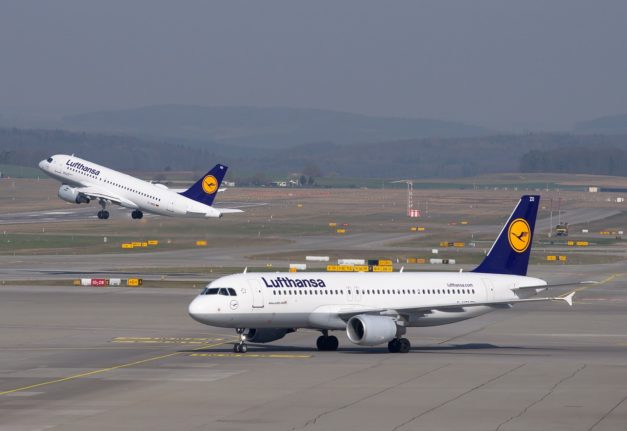On Thursday, Lufthansa cabin crew union Ufo entered the next round of collective bargaining with their employer. They had entered a peace truce over the four-day Easter weekend but are now back at the bargaining table.
What are their demands?
Ufo is calling for 15 percent more pay for the company’s approximately 18,000 flight attendants and their 1,000 colleagues at the regional subsidiary Cityline for a contract term of 18 months.
The union also wants to land an inflation adjustment bonus of €3,000.
Lufthansa – who last month announced a doubling of its annual profits – has already announced salary increases of almost ten percent over 24 months as well as an immediate one-off payment of €3,000.
READ ALSO: Germany’s Lufthansa more than doubles profit as strikes cast shadow
Ufo last paralysed flight operations with a strike on March 12th, affecting over 200,000 passengers around Germany.
That means they have the potential to strike again, especially as Germany nears peak travel season. In May there are three long weekends on the calendar.
Could other airport staff also strike?
According to a wage agreement presented last Wednesday, the approximately 25,000 ground staff at Lufthansa are to receive salary increases averaging 12.5 percent over two years as well as an inflation compensation bonus of €3,000.
However, the agreement is still subject to a consultation with Verdi members, who had previously voted in favour of indefinite strikes if their demands aren’t met.
This Friday will also see the start of arbitration for around 25,000 private security companies who check passengers, baggage, freight and staff at all airports around Germany – with the exception of Munich airport – on behalf of the Federal Police.
A wave of strikes
Germany has been hit by a wave of strikes the first three months of the year, affecting not only public transport but also schools and Kitas (daycares), supermarkets, doctors’ surgeries and public administration.
Deutsche Bahn reached a wage agreement with the GDL train drivers’ union last week, meaning that long-distance train travel will be strike free for at least the next couple of years.
However, other industries can and will continue to strike: on Thursday several transportation companies in eastern Germany and North Rhine-Westphalia announced strikes could occur soon due to unsuccessful negotiations, and this week Postbank, as well as regional Lidl and Kaufland supermarkets, were also hit by walkouts.
READ ALSO: Why Germany is being hit by strikes almost every day



 Please whitelist us to continue reading.
Please whitelist us to continue reading.
Member comments